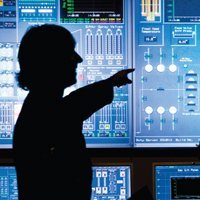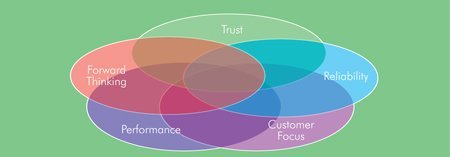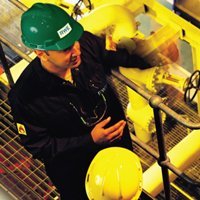
RWE npower is a leading energy company in the UK. It is part of the German-owned RWE, one of Europe’s leading utilities. Part of RWE’s strategy is to deliver cleaner, affordable, secure energy supplies for the UK while improving profitability.
RWE npower has over 11,000 employees across 60 sites in the UK. It provides more than 10% of all electricity in England and Wales. In the UK, RWE npower provides electricity and gas services to both B2C (business-to-consumer) and B2B (business-to-business) markets through its retail brand, npower. In 2007, npower supplied over six million residential consumers and 400,000 business customers. Business customers included large corporations such as BT, Ford and Wembley Stadium. Service organisations, such as schools and hospitals, also rely on npower.

The UK energy market is highly competitive. Both private and business customers can choose from several suppliers to get the best service and price.
RWE npower relies on its engineers taking appropriate and timely decisions at all levels. The company encourages all employees to become involved in decision-making. An example of this is the ‘Strategic Spare Parts Project’. The project was initially set up by RWE npower’s parent company RWE, as a strategy to minimise the risk of supply failure. npower Cogen, one part of RWE npower’s business, is responsible for implementing this strategy in the UK. npower Cogen generates combined heat and power for large organisations like oil refineries and chemical plants. The project aims to improve availability of vital spare parts for equipment to reduce plant availability costs. This project illustrates the concept of lean production, which uses resources more efficiently to lower costs and improve service.
This case study explores the way in which RWE npower delegates responsibility to extend the capabilities of its employees. Jay, a young graduate engineer, has been at RWE npower a relatively short time. He is responsible for the decisions that will achieve the required Strategic Spare Parts Project targets. As a mechanical engineering graduate, he has been involved in many different areas of work, ranging from preparing tenders and contract management to hands-on work activities that include routine maintenance, plant inspections, overhauls and improvements. In his words, ‘Working at RWE npower as an engineer is very different to the usual view of workmen in overalls. Engineers at RWE npower can be involved in anything from new build projects or existing plant site activities to office based work and/or projects.’
 Businesses need to make decisions for different reasons:
Businesses need to make decisions for different reasons:
All decisions have some degree of risk involved. For example, choosing the colour of paint for the office walls carries much less risk (and cost) than choosing the site of a new office. Decisions may be strategic, tactical or operational. These relate to levels in the organisation.
 An organisation’s structure affects how and where decisions are made. In large organisations, a traditional hierarchical structure is typical. Authority for decision-making is concentrated at the higher levels among few staff. Each level of management possesses different levels of authority – directors decide strategy; managers decide how to achieve the strategy, i.e. make tactical decisions; employees carry out instructions. A matrix structure, using people with different skills and abilities in project-based teams, allows more freedom and speed of decision-making.
An organisation’s structure affects how and where decisions are made. In large organisations, a traditional hierarchical structure is typical. Authority for decision-making is concentrated at the higher levels among few staff. Each level of management possesses different levels of authority – directors decide strategy; managers decide how to achieve the strategy, i.e. make tactical decisions; employees carry out instructions. A matrix structure, using people with different skills and abilities in project-based teams, allows more freedom and speed of decision-making.

RWE npower’s corporate values link the way it carries out its business to its strategic objectives:
Its culture of trust in its people and its emphasis on forward-thinking allow RWE npower to delegate decision-making to all levels through the organisation. This means that young, developing staff are encouraged to use their talents and abilities to deliver the desired performance and customer focus. This benefits RWE npower as it utilises all employees in both decision-making and how the business operates. Each decision relates to business objectives. RWE npower’s objectives focus on reliability and consistency of energy supply. If industrial customers requiring combined heat and power (CHP) to meet their process demands lose supply, production may be affected. Spare parts are vital to sustain energy supply. npower Cogen maintains a stock of spare parts. The questions needing to be asked were: are they the correct spares when considered against availability loss? When considering the cost of spare holdings, is the value of stock right?
Jay needed to make decisions based on an assessment of the risks linked to making changes or not doing anything at all. He had to evaluate which Cogen spare parts were ‘critical’ and what was the best way of managing the supply of these.
Jay’s work involved:
- looking at the range of Cogen parts kept in stock
- assessing the costs of maintaining and re-ordering this stock
- comparing these costs to the costs of breakdown and loss of supply.
The project required him to use a wide range of skills including gathering and analysing data, listening to stakeholders, managing his and other people’s time and budgets, and communicating with engineers and senior managers in preparing and presenting his findings.
Strategic decisions are those which affect the long term performance of the business and which relate directly to its aims and objectives. They are usually taken at the highest levels of management and carry higher levels of risk. However, effective strategic decisions bring high levels of reward.
The strategic decision to undertake the ‘Strategic Spare Parts Project’ was taken by directors at the highest level in RWE npower in order to support its objective of reliable supply. The expected rewards from the project were fewer availability losses leading to reduced costs and improved customer satisfaction.
The decision to give this project to Jay to project manage illustrates the way that RWE npower’s culture supports the delegation of decision-making powers to staff at all levels, using their known skills and competencies. Jay is a graduate engineer and has worked with Engineering and Maintenance staff across RWE npower’s portfolio. This experience meant he understood how equipment and the work of other engineers helped operations. He communicated with relevant staff, using his knowledge and experience, and obtained the necessary information to assess the project. A wide range of staff were involved in the project:

Jay concluded that the majority of spares for npower Cogen could be sourced as and when needed without greatly affecting the power supply. However, if the essential spares were not available, heat and power supplies could be affected for a long period of time. These items were confirmed as ‘critical’. With this information, Jay concluded that it was possible to find an alternative way of managing the spares process and make improvements. He went on to investigate the best ways to achieve these improvements.

Tactical decisions are medium term decisions. Whereas a misguided strategy could take a business in entirely the wrong direction and lead to failure, a misguided tactic would have a more limited impact. Strategies are usually in place for a long period of time; tactics tend to be more changeable.
The leaders of the Spares project created a strategy for managing spares, based on categorising parts into ‘critical’ and ‘non critical’. Within the strategy, various tactics were designed to implement it. The key tactic for this project was for Jay to consult with and involve staff at a number of levels. By getting first hand data, outcomes become more predictable.
If a tactic fails to achieve outcomes it can be adjusted or changed. Jay was trusted, given responsibility, but he was also accountable. He needed to present a convincing case that a new system was good business sense. Jay’s tactical decisions included choosing:

Jay’s findings will eventually be reported to directors. They have the final decision on whether high levels of investment in the project are worth the cost. This decision will seek to balance the risks with the costs of a significant investment in the strategy.

Operational adminstrative decisions may be smaller-scale, but are nevertheless important choices that people have to make to fulfil their roles. As RWE npower employees work in an open culture, where there is exchange of information and mutual trust, they feel empowered to take decisions. This sense of empowerment means that the organisation benefits from speed of decision. Open lines of communication encourage free flow of accurate information. Together, these things lead to better, informed decision-making at all levels.

In all levels in a business, there are constraints on decision-making. Jay for instance cannot decide to make an unlimited financial investment in the Spares Project. There may also be technical reasons why an action is not advisable. Constraints on decision-making are sometimes organisational. Some people at some levels cannot have authority to decide because they lack the knowledge or skills. At other times there are economic, political, environmental or legal constraints.
The culture of trust in RWE npower means that even at the operational level, staff can propose to make changes to how they do their job. The over-arching constraint is that such decisions must be in line with company aims and objectives. At an operational level, decisions must support the strategic direction of the business. All job roles carry specific responsibilities. At RWE npower, decision-making powers are delegated throughout the organisation. This means that people do not necessarily have to await a decision from a higher level. For example, an engineer dealing with an equipment fault is able to decide what is wrong and how to put it right without necessarily seeking authority from a manager. In this way, tasks can be completed more quickly and efficiently which is better for the business and the customer.
 All decision-making involves elements of risk and reward. For every decision there are risks. Many organisations are structured so that major decisions are taken at the highest levels. This is because decisions at the top can have major effects for the whole organisation. At the tactical and operational levels, the risks are smaller.
All decision-making involves elements of risk and reward. For every decision there are risks. Many organisations are structured so that major decisions are taken at the highest levels. This is because decisions at the top can have major effects for the whole organisation. At the tactical and operational levels, the risks are smaller.
At RWE npower, people at all levels are encouraged and empowered to make decisions informed by accurate information. By using the skills of people like Jay and by giving ongoing support and training, RWE npower is able to rely on good quality decision-making at all levels. The ‘Strategic Spare Parts Project’ project has the potential to create a more secure power supply and guarantee greater customer satisfaction.
